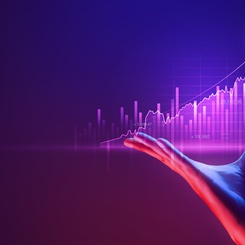and Gerard Guinamand, Group Chief Data Officer, Engie
Over the last few years, the web giants have shown that using data to know your customers is key for developing new products and services and for beating the competition. These companies operate on a digital core, allowing data-augmented and data-driven decision-making, and are highly appreciated by investors given their massive market capitalisations. Even during the COVID-19 pandemic, the tech sector continued growing spectacularly given the acceleration in digitalising the way we work and interact with others.
Any large, mature company is inspired by the way tech companies operate and dominate. For example, in France, L’Oréal aims to become the top beauty tech company by using artificial intelligence and augmented reality. Since 2018, Carrefour has used the Carrefour-Google Lab to accelerate its digital transformation. Danone and Microsoft launched The AI Factory for Agrifood in 2020. Energy companies like Engie and EDF are pushed by the general public sentiment on climate change to become operationally excellent and greener. Young data talents are hired to help transform the companies and introduce the new data culture.
Predictive mindset
In theory, the smart use of data and the creation of business value makes a lot of sense, though in practice traditional companies struggle within becoming more data-driven. Companies have been investing largely in data infrastructure over the last years, appointed chief data officers, and launched data training programs to convince every employee of the salient features of data and analytics. Consequently, massive amounts of data are stored in the cloud and often the question now is “what can we do with this?” or “what is the actual return on all these data investments?”. To answer such questions, a next step in the data maturity process of the company is essential. This is the step towards becoming more data-informed, data-driven, and operationally excellent, and it requires using data to look forward, rather than backward, and therefore make predictions. To put it differently, after storing and categorising data, it is now time to use it for decision-making across all levels, rather than specific pockets, of the organisation. In fact, business decisions always implicitly include predictions, and it is time to make this process more formal and automatic thanks to the use of data.
The predictive paradigm is not only about recommendation algorithms and the like: it also allows for the use of data at the highest executive level to ensure that strategy is implemented. Specifically, the management of forward-looking key performance indicators (KPIs) allows for measuring and tracking the success of the company and setting clear objectives. This in itself generates valuable data that can be correlated with new initiatives to predict their success and gain deeper understanding of their link with existing operations. To sum it up, C-level executives need to start implementing strategy with data rather than strategy for data, so that the company’s operating model can become data-centric in the same way as famous tech companies like Amazon and Ali Baba.
Someone once said, “Making predictions is hard, especially about the future”. Predictions are by nature uncertain and this has to be incorporated when making business decisions, similar to financial investors that use more information than the average return on an asset for deciding to buy or sell it. Accurate predictions are obtained when combining varying sorts of data, including external sources like weather-related data in energy applications. How to actually produce predictions using data is not a trivial task. It demands talented data scientists and advanced algorithms, plus continuous performance monitoring. It is not a surprise that the International Data Corporation expects global spending on artificial intelligence to increase from 43 billion EUR to 94 billion by 2024.
Renewables
The International Energy Agency expects renewables to provide 80% of the growth in global electricity demand through 2030. In fact, solar- and wind-energy projects have become less expensive, and interest rates are historically low today. Furthermore, governments are highly supportive, exemplified by the European Green Deal, whose main ambition is making the EU climate neutral by 2050. Renewable energies are therefore becoming a key strategic goal for the energy companies. Technically speaking, renewable energies (in particular wind and solar) have a high level of intermittence (night, absence of wind) but we cannot increase the number of plants to compensate for this lack of production for economic and environmental reasons. This situation implies two main actions for energy companies such as ENGIE. First, identify the best sites for new implementations. Second, get the best performance from the plants while taking into account operating constraints (noise for example) for a higher volume of electricity generated.
Data plays an essential role in the success of renewable development because it enables: the best selection of the optimal sites based on topography and weather forecast data, the best results based on technical availability, real-time weather and measurement data related to environmental constraints (noise), and optimizing of electricity sales by combining production data with data on demand, market prices, and storage capacities.
In terms of return on data investments, renewable energy forms a perfect use case where the value from data can be made explicit. In fact, these sources of energy are highly sensor equipped allowing for predictive maintenance, and for data monetisation. On the production side, there are no GDPR concerns. Operational excellence in the renewable energy business will be the only way to survive for incumbents. Traditional oil companies such as B.P. and Total are rapidly transforming themselves and will compete fiercely with the current energy players in the market of renewable energy.
ENGIE — ESSEC
Engie and ESSEC Business School have been working on different cases for three years as part of the Strategic Business Analytics Chair sponsored by Accenture. The Chair’s main objective is to train the next generation of leaders to develop new business strategies, leveraging the numerous applications of advanced analytics. Through a hybrid learning method based on innovation, collaboration and entrepreneurship, the Chair acts as the core of an ecosystem combining data and value creation – from purpose and strategy crafting to transformation, encompassing problem solving, data science & artificial intelligence, culture change and skills development.
Engie is an important part of the Strategic Business Analytics Chair’s ecosystem. In 2021, the Chair students will work on two strategic cases on renewable energy. Their fresh and forward-looking vision on the topics generates innovative ideas and valuable solutions. ESSEC students are particularly interested in working with companies like Engie given its strong environmentally-oriented strategic values. Indeed, the students, being concerned about climate change, prefer to work on business cases that ultimately generate societal value rather than purely commercial cases for e-commerce platforms.
Looking forward
In the future, renewable energy will lead to the creation of many new jobs requiring technical, data and analytics skills. The EU reports that already the solar photovoltaic industry alone accounted for 81,000 jobs with expected increase to 175,000 and 200,000-300,000 jobs in 2021 and 2030 respectively. Digitalisation and renewable energy go hand in hand and will be an important driver for economic growth. The Partnership with Engie and ESSEC will guarantee that young talents are trained and acquire the skills to make sure the transition to a green society is completed satisfying the climate change agreements.
More generally, it will be the companies which employ the people with the right skills, mindset and vision that will make the difference. Data is now available, most analytics tools that create value are standard, and computational resources have little constraints. It is the culture of the company that requires a fundamental change. Those who will be able to attract young “data ready” business graduates are going to be at the competitive edge.
Accenture mentions in its Technology Vision 2020 that the tech-clash is a new situation, where on one hand, people are enthusiastic about technology, data and artificial intelligence, but on the other hand, they require algorithms to be understandable and fair, and know where their personal data is used. This balance will be extremely important in the post COVID-19 era, where all that matters will be human experiences.









